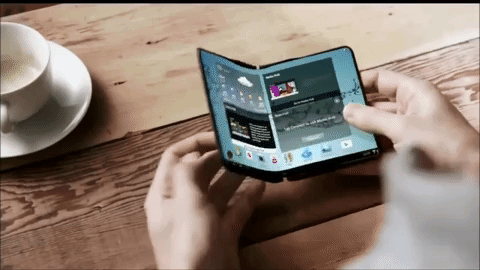Samsung Confirms Foldable Phone for 2018: Will It Fly?
Samsung has confirmed that its long-awaited foldable handset, likely the Galaxy X, is launching sometime this year.

Samsung's Galaxy X foldable smartphone has reportedly been in the works for years. But at long last, it might finally hit store shelves in 2018.

In an earnings call on Wednesday (Jan. 31), Samsung confirmed that it will develop "foldable OLED smartphones" that it plans to release in 2018, according to ZDNet, which earlier reported on the comment. Samsung didn't mention exactly when the device might launch, but did say that it's been working on a production facility that should allow for this year's launch.
Exactly what the foldable smartphone might look like has been the subject of debate for quite some time. Some reports contend that the smartphone will simply fold on itself like a traditional clamshell flip phone. Others, however, have said that the handset will have a folding screen that can be extended out to 7.3 inches when it's in use.
Is this concept really going to become a reality this year, though? It's likely, though it may not come to the U.S. at first.
"Let's take Samsung at their word and lets peg it at this year. If it shows up later than that, then we can point to production problems or supply problems and how difficult it is to get this right," said Ramon Llamas, an analyst at IDC covering phones and wearables. "If it's only limited to Korea, think of it as a controlled experiment as opposed to an all-out global release."
The idea is that the foldable handset would merge the worlds of a smartphone and tablet, all while keeping its footprint small enough to be used as a handset.
MORE: Samsung Galaxy X Rumors: Foldable Phone Release Date, Specs and More
Get instant access to breaking news, the hottest reviews, great deals and helpful tips.
Samsung has been testing different designs for years and has allowed some of its mobile partners to test out some of its best concepts. While Samsung hasn't said which version will ultimately hit store shelves, it did say last year that it would release the Galaxy X in 2018. Now it seems poised to actually do that. However, Llamas isn't convinced that the use case has been well defined.
"For this new form factor, the thing is not just to do it for technology's sake or to flex your innovation muscles," said Llamas. "What's going to be the killer app for this thing?"

The IDC analyst points the ZTE Axon M, a foldable phone with an awkward mechanical hinge, as an example of what not do do: "Yeah, with our dual screens, you can watch video on one side and check your calendar on the other, and I thought to myself 'The human brain does not process things that way.'"
There are also practical concerns that Samsung would need to work through with a foldable device. For example, would there be a crease on the screen when the device was unfolded, and how distracting would that be? And would the foldable phone be uncomfortably thick when folded up? Then there's the software side of the equation.
"To really make this work, the software experience would have to be completely frictionless and other key smartphone elements — like camera quality — would have to be uncompromised relative to other flagship smartphones," said Avi Greengart, research director for consumer platforms and devices at GlobalData.
Then again, the Galaxy X (or whatever Samsung winds up calling the device) wouldn't have to be a top seller for Samsung to call it a win for the company. For instance, the Galaxy Note Edge in 2014 introduced the idea of a curved display on Samsung phones before the technology made its way to other handsets.
"Samsung's brand image is tied up with innovation," said Greengart. "Samsung may not have to sell many of these for it to be a useful marketing tool."
Aside from discussing the Galaxy X, Samsung used its earnings call to talk up its next big release, the Galaxy S9. Samsung didn't dig into too many details, saying only that it would maintain its position as a leading smartphone maker with the Galaxy S9 unveiling on Feb. 25. The Galaxy S9 is expected to hit shelves alongside the Galaxy S9+ in mid March.
Mark Spoonauer is the global editor in chief of Tom's Guide and has covered technology for over 20 years. In addition to overseeing the direction of Tom's Guide, Mark specializes in covering all things mobile, having reviewed dozens of smartphones and other gadgets. He has spoken at key industry events and appears regularly on TV to discuss the latest trends, including Cheddar, Fox Business and other outlets. Mark was previously editor in chief of Laptop Mag, and his work has appeared in Wired, Popular Science and Inc. Follow him on Twitter at @mspoonauer.

